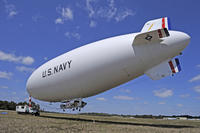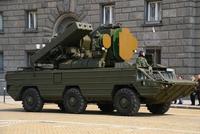-
Insects’ way of flying inspires design of tiny flying robots
Researchers have identified some of the underlying physics that may explain how insects can so quickly recover from a stall in midflight — unlike conventional fixed wing aircraft, where a stalled state often leads to a crash landing. The analysis improves the understanding of how insects fly and informs the design of small flying robots built for intelligence gathering, surveillance, search-and-rescue, and other purposes.
-
-
U.S. Navy dominates competition for number, quality of patents
The IEEE evaluated more than 5,000 organization patent portfolios, across the seventeen industry sectors evaluated in its scorecard, for the number of patents issued as well as the growth, impact, originality, and general applicability across their respective portfolios. A laser with the potential to jam heat-seeking missiles and sniff out chemicals was one of 358 technologies patented by the U.S. Navy in 2012, helping the service dominate the government category in an annual ranking of patent portfolios published 23 October. It is an achievement the Navy has held since the scorecard added the government category in 2008.
-
-
Navy blimp returns to Maryland, Virginia, and D.C. skies today

The U.S. Navy’s only manned airship, a modified American Blimp Corporation A-170 series commercial blimp, will return to the skies of Maryland today, 12 November, to conduct week-long testing of experimental avionics systems.Results of this research may ultimately help protect forward deployed U.S. Army and U.S. Marine Corps troops around the globe.
-
-
DoD ends ambitious blimp program
The Department of Defensehas decided to end its Long Endurance Multi-Intelligence Vehicle (LEMV) project.The blimp was supposed to fly for as long as three weeks at a time, gather intelligence using 2,500 pounds worth of the most advanced cameras, sensors, and other intelligence technology. Operating at an altitude of 20,000 feet, the airship was designed to withstand enemy fire with its blend of fabrics, including kevlar. The Pentagon spent $297 million on the airship, but last month sold it back to one of the contractors which built it for $301,000.
-
-
Kenya, Somalia to create joint anti-terrorism task force
Al-Shabaab’s attack on the Westgate shopping mall in Nairobi last month has prompted security officials in Kenya and Somalia to consider the creation of a joint task force which will share intelligence, monitor activity, and track finances relating to terrorist groups operating in East Africa. Also under discussion is the establishment of a joint East African paramilitary force with jurisdiction throughout the region.
-
-
Weakening cybersecurity to facilitate NSA surveillance is dangerous: experts
In the wake of revelations about the NSA surveillance programs, an expert on surveillance and cybersecurity recommended a re-evaluation of those surveillance practices that weaken commercial products and services. These practices include weakening standards and placing “back doors” into products that are accessible to U.S. government agencies. The expert – Jon Peha, former chief technology officer of the FCC and assistant director of the White House’s Office of Science and Technology — said deliberately weakening commercial products and services may make it easier for U.S. intelligence agencies to conduct surveillance, but “this strategy also inevitably makes it easier for criminals, terrorists and foreign powers to infiltrate these systems for their own purposes.”
-
-
Nuclear experts: world is safer, but risks remain
Speaking at a two-day short course on Nuclear Weapon Issues in the Twenty-First Century earlier this month, leading nuclear weapons scientists and policymakers said that despite some troubling areas, the world is a safer place than in past decades, and they expressed cautious optimism it is continuing in that direction. They warned, however, that despite this progress, crises involving nuclear weapons can still spiral out of control.
-
-
The irreducible elements of a Freeze Plus interim agreement with Iran
Iran and the P5+1 are set to resume talks on Iran’s nuclear program tomorrow, Thursday, 7 November in Geneva.The Institute for Science and International Security (ISIS) has developed a list of what it calls “irreducible elements” which a negotiated interim agreement should aim to achieve. These four elements are: Stopping the advance of Iran’s centrifuge and Arak reactor programs; extending breakout times; capping the Iranian centrifuge program and ensuring that it will not expand beyond this cap (in terms of enrichment output) during the next 5-15 years; and increasing the chance of finding a secret centrifuge or plutonium separation plant.
-
-
UAV developer CyPhy Works raises $7 million to build flying robots
Danvers, Massachusetts-based CyPhy Works, a developer of advanced UAVs, the other day announced the close of a $7 million financing round led by Lux Capital, with participation from General Catalyst Partners, Felicis Ventures, and several undisclosed angel investors. As part of the financing, Lux Capital Partner Bilal Zuberi will join the CyPhy Works board of directors. The company says it targets 24/7 “persistent” operations.
-
-
U.S. drone strike kills top al-Shabaab bomb maker
The U.S. military has confirmed the killing of Ibrahim Ali Abdi, also known as Anta Anta, the explosives specialist who headed al-Shabaab’s bomb-making efforts with an expertise in suicide missions, road-side explosives, car bombs, and other homemade bombs. The administration had been reluctant to follow in Somalia the punishing drone campaign it has been conducting in Pakistan and Yemen for fears that such a campaign might transform al Shabaab from a regional organization focused on repelling foreign troops – from Kenya, Ethiopia, and the African Union — from Somalia into a group which adopted al Qaeda’s agenda to strike the West at every turn. The killing of Anta, and the failed raid three weeks ago to kill another Shabaab leader, Abdulkadir Mohamed Abdulkadir, are indications that the administration has decided to escalate the fight against the Somali group.
-
-
Israel destroys advanced Syrian missiles on their way to Hezbollah

Israel Air Force (IAF) planes on Wednesday night attacked and destroyed two military bases in Syria – one near Damascus and the other in Snobar Jableh, thirty kilometers south of the port city of Latakia. The Syrian military was preparing two large shipments of surface-to-air missiles – advanced versions of the SA-8 Gecko and S-125 Neva/Pechora – for delivery to Hezbollah. The IAF destroyed the missiles before they were loaded onto truck for the trip to Lebanon. Wednesday’s night attacks were the sixth and seventh attacks Israel launched against Syrian shipments of advanced arms to Hezbollah. The earlier five attacks took place on 30 January, 3 May, 5 May, 5 July, and 18 October.
-
-
Russia to build floating nuclear power plants

Global warming is opening the Arctic Ocean to shipping – and causing the rapid melting of Arctic ice. Russia says that ship-based nuclear power plants would allow it to provide power to remote cities in Siberia, and provide power to oil and gas drilling operations in the Arctic (about 30 percent of the world’s unclaimed natural gas is in the Arctic, and about, 60 percent of that unclaimed natural gas is in the Russian Arctic). Experts worry about the ability of ship-based nuclear reactor to withstand extreme weather events, or terrorist attacks. The U.S. Army deployed its own floating nuclear reactor – the Sturgis – in the Panama Canal Zone from 1968 to 1976.
-
-
Video imaging system for remote detection of hidden threats
By adapting superconducting technology used in advanced telescope cameras, researchers have built a prototype video imaging system for detecting hidden weapons and other threats at distances up to twenty-eight meters away.
-
-
Death of Muslims used by extremists for recruitment, propaganda
In the last thirty years, conflicts in Afghanistan, Iraq, Bosnia, Chechnya, Somalia, and other countries have caused the death of four million Muslims. The theme of innocent Muslims dying as result of conflicts initiated by Western powers and their allies is a central motif used by Islamic militants to recruit new members. It is a theme which fuels anti-American sentiments in the Middle East and North Africa. Historians and Islamic scholars note that the notion that the West is orchestrating a “genocide” of Muslim is patently false, and that beginning with the Iran-Iraq War (1980-88) and continuing to the present day, more and more casualties are inflicted by Muslims against Muslims. Still, the myth of a non-Muslim genocidal “crusade” against Muslims is powerful, and is one which is effectively used by al Qaeda and other Islamic terrorist groups.
-
-
Peru reopens UFO investigation office
The Peruvian air force, saying it was responding to an “increased sightings of anomalous aerial phenomena” in the country’s skies,” has reopened its Departamento de Investigación de Fenómenos Aéreos Anómalos (DIFAA). The investigative office was established in 2001 but closed in 2008. DIFAA will bring together sociologists, archaeologists, astronomers, meteorologists, and air force personnel to analyze these anomalous events. Peru is not the only Latin American country showing renewed interest in UFOs.
-
More headlines
The long view
Bookshelf: Smartphones Shape War in Hyperconnected World
The smartphone is helping to shape the conduct and representation of contemporary war. A new book argues that as an operative device, the smartphone is now “being used as a central weapon of war.”
